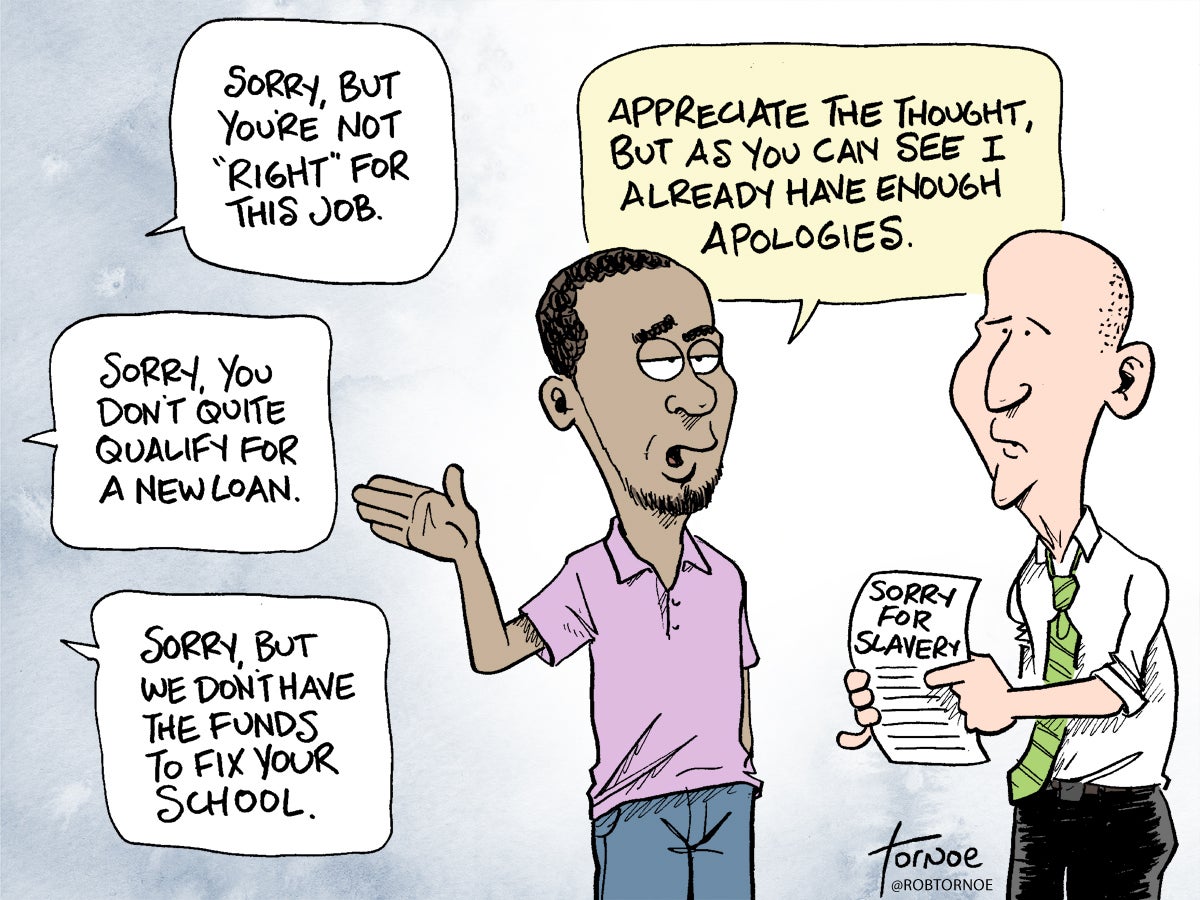If you hated Delaware’s apology for slavery, you might be a racist

Many people don’t realize that despite being part of the Union during the Civil War, tiny Delaware was a slave state.

Many people don’t realize that despite being part of the Union during the Civil War, tiny Delaware was a slave state. In fact, Delaware was a microcosm of the nation as a whole – a state divided among its urban north and rural south.
Which is why the reaction of Gov. Jack Markell’s apology for slavery on the behalf of Delaware – just the ninth state to officially acknowledge it’s role in perpetuating this barbaric act – is so illuminating.
Liberal critics are correct that an apology doesn’t mean much if it’s not attached to any actionable steps, such as reparations, that would help African-Americans still fighting against prejudice in the 21st century. In fact, the resolution itself strictly forbids its use in litigation, which is why I focused my cartoon on the idea of a young black man sick of all the seemingly empty apologies he’s hearing.
Markell even acknowledged the disconnect as he signed the apology when he said, “Signing this resolution is an important step, but if anybody thinks this is the last step, then we are nowhere.”
Despite this, the apology does make an important acknowledgment of contrition that the state of Delaware did condone a grievous wrong some 150 years ago. In fact, considering the First State was one of the last to continue the practice of slavery (only Kentucky and Mississippi allowed it longer), the apology might also have the added effect of educating people ignorant of the state’s dark past.
Speaking of ignorant, the other side of the critical coin are those who think an apology is unnecessary due to an unwillingness to admit that the terrible policies maintained by Delaware and others have rippled through time to effect the lives of African-Americans today.
Taking one look at the comments on Markell’s Facebook post announcing the apology peaks volumes about casual racism in the state today.
“People looking at the past, and blaming another race for the problems they have today, is why racism will never go away,” wrote one commentator. Another was willing to back the apology, “[B]ut let the blacks say sorry first being on the top of the list for welfare, food stamps, doing crimes, don’t want to work, 20 kids by age 30, blame others for their problems, etc…”
This is a mindset that has permeated into the conservative consciousness, one that Stephen Colbert used to brilliantly parody by claiming, “I don’t see race. People tell me I’m white and I believe them because I buy my drugs at a pharmacy.”
For decades, social scientists have found that when asked, a majority of conservatives (including many of the Republican candidates for president) believe racial inequality is caused by the failure of African-Americans to work as hard as their white counterparts. Ask a conservative to close their eyes and describe a person on welfare, and watch them cringe and contort themselves into trying to avoid using the word “black.”
“Racial considerations are the single most important factor shaping whites’ views of welfare,” said political scientist Martin Gilens, who found that whites held far mare negative stereotypes of black mothers on welfare than white mothers on welfare.
That’s modern racism, and it’s happening right now all across the state. Markell’s apology might not accomplish much in terms of policies than can help address and combat inequities in our society, but contrition itself can be a powerful motivator in the war against ignorance.
English Prime Minister Tony Blair’s apology to the Irish for England’s role in the Irish Potato Famine, which killed over a million people, opened the door to reconciliation between both countries. Ronald Reagan’s formal apology for the internment of Japanese-Americans during World War II educated the nation about a much-overlooked wrongdoing. The Vatican’s apology for the persecution of Galileo was an important statement about the ability of science and faith to co-exist.
Markell was born 59 years after Delaware finally ratified the Thirteenth Amendment, so he had nothing to do with slavery. Neither did I or most of the nearly million citizens that currently live in this state. But that doesn’t mean it didn’t happen, and we owe it to our ancestors to recognize and condemn this terrible chapter in our recent past.
Delaware’s mea culpa is just the first step. Sadly this unfortunate story, already over 300 years old, is far from over.
Rob Tornoe is a cartoonist and WHYY contributor. Follow Rob on Twitter @RobTornoe
WHYY is your source for fact-based, in-depth journalism and information. As a nonprofit organization, we rely on financial support from readers like you. Please give today.




